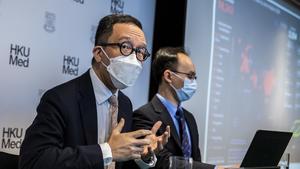 Gabriel Matthew Leung, dean of the University of Hong Kong's Li Ka Shing Faculty of Medicine (left) and Division of Epidemiology and Biostatistics, School of Public Health, HKUMed, Professor Joseph Wu, speak at a press conference about estimating the clinical severity of COVID-19 amongst symptomatic cases from the transmission dynamics in Wuhan in Hong Kong on March 6, 2020.
(ISAAC LAWRENCE / AFP)
Gabriel Matthew Leung, dean of the University of Hong Kong's Li Ka Shing Faculty of Medicine (left) and Division of Epidemiology and Biostatistics, School of Public Health, HKUMed, Professor Joseph Wu, speak at a press conference about estimating the clinical severity of COVID-19 amongst symptomatic cases from the transmission dynamics in Wuhan in Hong Kong on March 6, 2020.
(ISAAC LAWRENCE / AFP)
HONG KONG - The ongoing universal screening helps Hong Kong to break through the bottleneck of testing work of COVID-19, Gabriel Leung, an adviser to the Hong Kong Special Administrative Region (HKSAR) government on COVID-19, told Xinhua on Friday.
READ MORE: Experts, residents welcome extension of mass testing
Leung, also dean of the Faculty of Medicine at the University of Hong Kong, said that the HKSAR government's Universal Community Testing Program can help address the problem of inadequate testing in Hong Kong since the COVID-19 outbreak.
Gabriel Leung, Dean of Faculty of Medicine at the HKU, said that the HKSAR government's Universal Community Testing Program can help address the problem of inadequate testing in Hong Kong since the COVID-19 outbreak
He expected Hong Kong to have a fourth or even fifth wave in autumn and winter, when vaccine supplies are still unavailable. Therefore, preparations should be made in advance and the program can help enhance the screening and to clear off the third wave of the epidemic.
The program was launched on Tuesday by the HKSAR government. As of 8 pm local time Friday, about 953,000 residents had made appointments and about 284,800 samples collected had been tested, according to the HKSAR government.
ALSO READ: HK testing extended to Sept 11 as 12 new infections confirmed
Eight samples were tested positive so far. Among them, four were previously confirmed cases, and the other four were new cases. Leung said if the whole population of 7.5 million people in Hong Kong were tested, it is expected that about 400 silent carriers would be identified, in which about 140 of them have second-generation transmission capability.
The more people are tested, the faster the second-generation transmission chain can be found, he stressed, urging the public to actively participate in the screening program so as to end the third wave as soon as possible.


